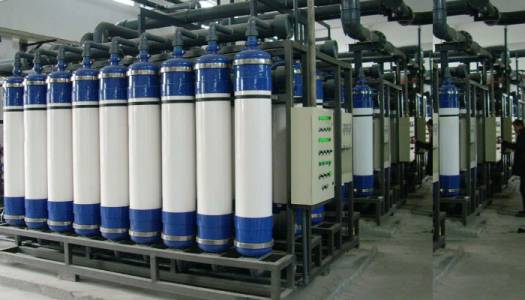Description
Ultrafiltration: Advanced Membrane Filtration for Superior Purification
Ultrafiltration (UF) is a pressure-driven membrane process that effectively separates particles and macromolecules from liquids. This advanced filtration technology utilizes membranes with precisely defined pore sizes, typically ranging from 0.01 to 0.1 microns, to remove undesirable components while preserving valuable constituents. Unlike other membrane processes, UF retains larger molecules while efficiently removing smaller ones, making it ideal for a wide range of applications.
How it Works:
Ultrafiltration employs a semi-permeable membrane to separate dissolved and suspended solids from a liquid feed stream. A pressure differential, typically achieved using a pump, forces the liquid across the membrane. Larger molecules and particles are retained on the membrane surface, forming a concentrate stream, while smaller molecules and the solvent (usually water) pass through the membrane as a permeate stream. This process is highly efficient and produces a clarified liquid with significantly improved purity.
Key Benefits of Ultrafiltration:
- High Efficiency: Removes a broad spectrum of contaminants including colloids, bacteria, viruses, and larger molecules.
- Selective Separation: Precise pore size control enables selective retention of desired molecules while removing unwanted substances.
- Gentle Processing: Minimizes shear forces, protecting sensitive biological materials and preventing denaturation.
- Reduced Chemical Usage: Often eliminates or significantly reduces the need for harsh chemicals typically employed in other purification processes.
- Energy Efficient: Compared to some traditional methods, UF typically requires less energy.
- Scalable Technology: Available in a range of sizes and configurations to suit diverse production capacities, from laboratory scale to large-scale industrial applications.
- Reduced Waste: Produces smaller volumes of concentrate compared to other separation techniques, minimizing waste disposal costs and environmental impact.
Applications of Ultrafiltration:
Ultrafiltration finds widespread application across numerous industries, including:
- Water Treatment: Removal of turbidity, suspended solids, bacteria, and viruses from surface water and groundwater.
- Food and Beverage: Clarification of juices, wine, and other beverages; concentration of proteins and enzymes.
- Pharmaceutical and Biotechnology: Purification of biologics, separation and concentration of proteins, and sterile filtration.
- Wastewater Treatment: Removal of suspended solids, organic matter, and pollutants from industrial and municipal wastewater.
- Chemical Processing: Purification of chemicals, separation of valuable products from reaction mixtures.
Membrane Materials:
Ultrafiltration membranes are typically made from various polymers, including:
- Polyethersulfone (PES): Offers high flux and good chemical resistance.
- Polyvinylidene fluoride (PVDF): Exhibits excellent chemical resistance and thermal stability.
- Regenerated cellulose: Biocompatible and suitable for applications involving sensitive biological materials.
The choice of membrane material depends on the specific application and the characteristics of the feed stream.
Choosing the Right Ultrafiltration System:
Selecting the appropriate ultrafiltration system requires careful consideration of several factors, including:
- Feed characteristics: Composition, viscosity, and concentration of the feed stream.
- Desired separation targets: Specific particles or molecules to be removed or retained.
- Production capacity: Required throughput and system size.
- Operating conditions: Temperature, pressure, and flow rate.
Conclusion:
Ultrafiltration offers a versatile and powerful solution for a wide range of purification and separation challenges. Its efficiency, selectivity, and gentle processing make it a preferred method in diverse industries striving for improved product quality, reduced costs, and minimized environmental impact. Contact us today to discuss your specific needs and explore how ultrafiltration can benefit your operations.
